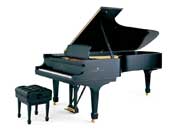By Mike Telin
Cleveland, OH — August 1, 2011
Five pianists played in the penultimate session of the second round on Monday afternoon.
Marina Baranova (30, Ukraine/Germany) gave sensitive and stylish readings of Scarlatti’s Sonatas in C Major (K.159) and f minor (k.466). Her discrete use of pedal and clear articulations, combined with some nice ornamentation, made for pleasurable listening. Continuing with two works of Schumann, the ABEGG Variations, Op. 1 and Faschingsschwank aus Wien, Op. 26 Ms. Baranova once again showed her technical command of the instrument, and made easy and clean work of the numerous rapid scale passages in both pieces. In general she approached the ABEGG Variations from an introspective point of view, creating some beautiful phrasing and lovely articulations. These fine qualities also featured in her performance of Faschingsschwank aus Wien, along with grand fortissimos.
Naomi Kudo (24, USA/Japan) began with Jean Francaix’s “Hommage a Frederic Chopin” (La Promenade d’un Musicolgue Eclectique) (1987) and followed it with the Etude in A-Flat Major, Op. 25, No. 1 (Aeolian Harp) by Chopin, which made for an interesting musical juxtaposition. Ms. Kudo gave a lovely performance of Francaix’s brief work, and her playing of the Chopin was extremely clear and well balanced, never allowing the “harp” motives to cover the melody. Ms. Kudo made easy work of the technical demands found in Robert Schumann’s Carnaval, Op. 9, bringing a playfulness and creativity to this somewhat quirky, multi movement piece. One could feel the presence of the Carnaval revelers.
China’s Fei Fei Dong (21) exudes Chopin from her very being, and her performances of the Rondo in E-flat major, Op. 16 and the Waltz in A-Flat major, Op.42 were performed brilliantly; she played both pieces as though she were improvising the music. She has the technique to toss off cascades of notes with ease and whimsy, and she is fun to watch as well. Rounding out her program was Beethoven’s Sonata No. 18 in E-Flat Major, Op.31 No. 3 (The Hunt). Although the printed program indicated that this would be performed third, she chose to place it second, following a very brief pause after the Rondo, which caused a moment of confusion for the audience; however, ending with Chopin was a very wise move. While Ms. Dong gave a clear and technically proficient performance of Beethoven, Chopin is her most certainly her forte.
Following intermission it was the gentlemen’s turn to take the stage. 29 year old Alexander Schimpf (Germany) is a thoughtful musician, and chose three pieces of diverse styles for his second round performance, the English Suite No. 3 in G Minor, BWV 808, of J.S. Bach, Fantasie II (2009) of Adrian Sieber and Johannes Brahms’ Ballade No. 4 in B Major, Op. 10. Mr. Schimpf shaped each of the seven movements of the Bach suite with clean, neat and precise rhythms and articulations. Gavotte I was beautifully articulated in both hands; for contrast, he played Gavotte II legato, which made a fine effect when the first dance was repeated. He ended with a rapid-paced Gigue full of dynamic and color changes. In the Sieber, he passionately performed the work’s broodingly solemn opening which built to a climax followed by the tinkling of bells; it builds again only to die way into nothingness with both hands at the extreme ends of the keyboard. He performed the Brahms with a dark, restrained passion.
Last up, Mateusz Borowiak (23, U.K./Poland) brought two works to his second round: Mozart’s Sonata No. 9 in D, K. 311 and Bacewicz’s Sonata No. 2 (1953). Mr. Borowiak had a healthy, no-nonsense approach to both pieces. He brought out the many musical whimseys Mozart has to offer in this sonata with brisk tempos in the outer movements and a beautiful sensitive line in the slow middle movement. However his phrasing sounded a little choppy because he broke lines up into short segments. During the acrobatic three movement sonata of Bacewicz, he produced a very clear sound that was never harsh even in the thickest of textures. All the piece’s musical lines were purposeful and made sense out of the work’s many changes of mood.
In tonight’s session, we’ll hear the last four performers play their round two selections.



